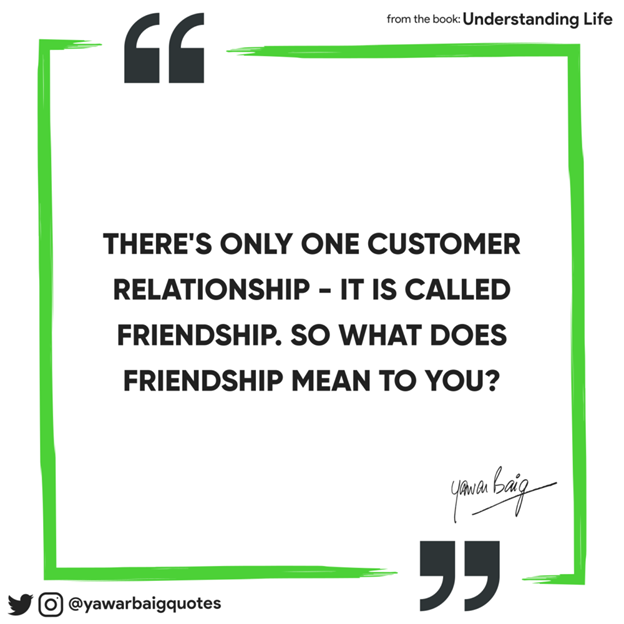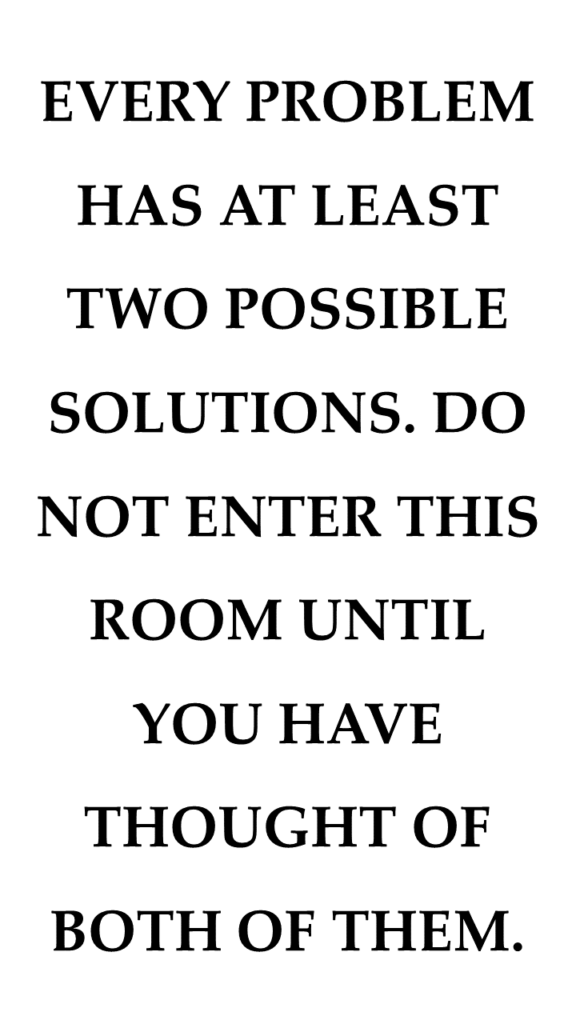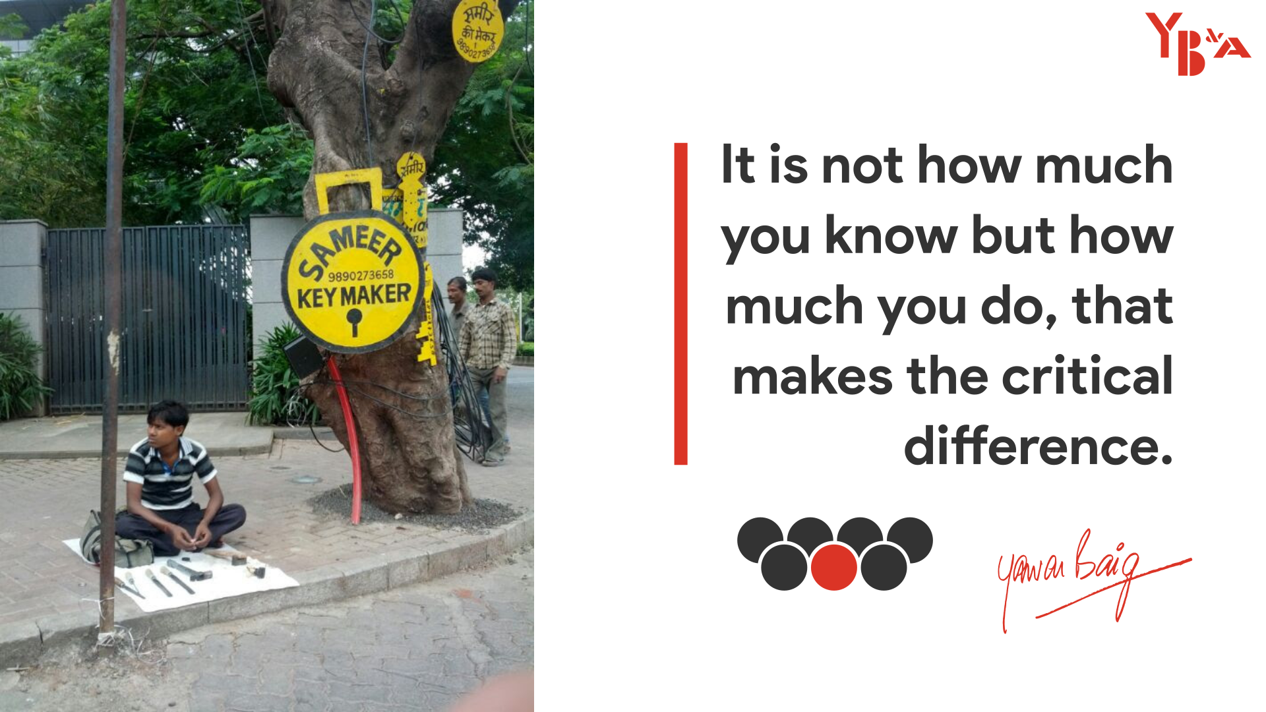
How to beat Goliath
Because size doesn’t matter
I have formulated 6 rules which I call David’s rules. These are for anyone facing the big o...


The desire for entrepreneurship is a strong natural urge which in my view is the logical development of leadership in a person, which encourages him/her to become independent and strike out on their own. In days of old, they called it, ‘seeking your fortune’, which ranged from traveling across the world to trade, to buccaneering and banditry masquerading as adventure and conquest. Be that as it may, the crux of the matter was as in the song, “A man and his will to survive”, where you pit your wit and overcome challenges and build a future for yourself, different and better than your compatriots ‘back home’. That spirit remains to this day as I believe it is a primordial urge and the fulfillment of all that one aspires for. Today, that is usually in setting up a business of your own, becoming an entrepreneur. Not quite as dangerous physically as sailing the high seas on a Dhow or Clipper ship or leading an army across the land but equally anxiety generating in terms of facing the possibility of financial ruin for oneself and one’s family.
In my leadership courses, I sometimes ask the question, “How many of you want to start your own business?” Invariably most of those present raise their hands. But they and I know that less than 1% will even try to break out of corporate lives and take charge of their own futures. They prefer to live in the self-deception that there is ‘safety’ in working for another, though their own experience shows that it is a mirage. The truth is that not everything that is tried succeeds, but nothing succeeds without trying. I hope I can convince you to try, and want to give you some pointers about how to do it.
For those interested, I recommend my book, ‘An Entrepreneur’s Diary’. It is a record of my own journey, and you will find answers to many questions.
So, here goes: There are two questions which you must answer first.
What is your offering?
For most people, this is often the most difficult thing to define. The reason is because they are thinking of this as a lifelong commitment to one thing on which to build your fortune and hopefully a dynasty. While it is essential to differentiate and we will talk about that in a bit, it is even more important to learn how to do business first. Skills like budgeting, P&L accounting, sales, distribution, recruitment and most importantly sourcing and managing finances. Some you will need to do yourself and others can be outsourced, but all of which you must know and be familiar with. But even more importantly is the mental and emotional strength you need to deal with anxiety, uncertainty, rejection, loss, competition; back-stabbing and disloyalty by team members and customers and many more. This is an aspect of entrepreneurship that many ignore and pay the price.
What keeps you going and leads to success is faith in yourself when all around you seems to be falling apart. I don’t mean being blind to objective, reliable data but trusting your idea after ensuring that you have done your homework, no matter how many naysayers happen along. I know many people who give up because, ‘Everyone said it wouldn’t work.’ I say to them, ‘Everyone was right but not for the reason you think. Everyone was right because they were saying in effect, ‘If you are so unsure of yourself, you will fail.’ The confidence that I am talking about can come only one way, by taking risks, working until you see stars in daylight, crying in the night when the world is asleep, but getting up next morning and marching on. That is called courage, and it comes only from facing your fears and staring them down. That’s what makes entrepreneurship so exciting and rewarding. People only see the outcome. They don’t see the backbreaking effort, heart stopping decisions, and rivers of sweat and tears that powered your success. Only you are the witness. And that should be enough.

The first thing to do when you decide to become an entrepreneur is to start a business. Ideally in the area that you eventually intend to specialize in, but if that is not possible, then in any area where you will need to learn how to assess risk, manage funds, build a team, sell a product or service, and sharpen your communication and relationship skills. These skills are common to all kinds of businesses and will eventually spell the difference between success and failure, because these are things that only you can and must do, no matter how small or large your business grows. Especially communication and customer relations are critical to life and growth skills.
Starting a business is like having a baby. It has a period of development which can’t be hurried and then a period of intense pain before it is delivered. It took me 13 years of preparation with no end in sight before I launched my company, Yawar Baig & Associates (https://yawarbaig.com) That is not a standard but a measure of the kind of patience and investment in yourself and your business that you must be prepared to make, to succeed. Why would you do it? For the same reason as with the baby. It is your baby.
Differentiation creates brand. Brand inspires loyalty. Loyalty enables influence. The more clearly you can define your product, the better. It is not what you think you do, but what your customer thinks you do, that matters. Many CEOs forget this and invest fortunes in ad campaigns and social media blitz but almost nothing in learning and teaching their people how to treat customers, solve problems, provide memorable service that will be remembered and inspire loyalty. Your customers build your brand. Not you or your ad agency. You exist because of your customer. Forget that at your own peril. Remember and honor it and you won’t need another ad campaign or brand building exercise. I am always amazed at the colossal time and energy that top management spends agonizing over the color of the logo and the punch in the ad line. While if they just walked into their own office incognito and spoke to their front-line people, they would know where they need to invest their time and energy.
Please read his and comment.
https://yawarbaig.com/your-customers-build-your-brand-not-you/
In GE we have a system called VOC – Voice of Customer. Every business invites their customers to come in and talk to them on a designated day. Drinks and snacks and chat. Tell us about your experience dealing with us. No formality, straight from the shoulder, frank and fair. Good, bad and ugly. The role of the listeners is to listen, empathize (not simply make appropriate noises), take notes and solve problems. No giving justifications or excuses. It is one of the most effective and powerful systems that I know to build great customer relationships and ensure customer satisfaction and loyalty. In my consulting practice, I tell CEOs, business heads and promoters to go to the market and talk to the end users of their products, even if they only sell to wholesalers or agents. Talk to the individual Tom, Jane, and Bihari. That is the most reliable feedback about the success of your business. The sad reality is that as a business grows, founders and top management get isolated and lose touch with end users and their own frontline staff. That is suicide.
Much has been written about building a winning brand and about the importance of branding in general. In my view successful branding is the result of a 2 – step process which is as follows:
So that every time they think of what you provide, they have only one name that they can recall and that is yours. Like all truly powerful ideas, it is very simple. The key is in executing it passionately, seamlessly, and consistently.
In my view, if you are competing against anyone, i.e., if your customers or potential customers are even considering your competitors as potential fulfillers of their need, then you have failed. In the words of Sun Tzu, ‘The best general is the one who wins without fighting.’ And that is the hallmark of successful branding – that you leverage yourself out of the competition.
Why are you offering it?
This is really a combination of two questions: Who is your target customer and what is their need that you are planning to fulfill? The trap that many fall into is to work on assumptions and feelings about customer need without solid research to back that assumption. It is acceptable to start with an assumption like a hypothesis in an experiment, but you must then set up the experiment to disprove your hypothesis. Not to prove it. Your failure will then be success in that it will show you that your hypothesis is correct.
Take Uber for example. I see Uber’s target customer not as the person calling the cab but the cab owner. People need transportation and they had it. Nothing new there. But people also had cars, free time and the need for another revenue stream. Uber connected the dots. Use your own car, work in your own time, and earn a decent living, based on how much you want to drive. The passenger is inevitable. The target customer is the car owner. I see Airbnb also in the same light. I have a couple of extra rooms in my house and need the money. Or I want to maximize rental income, so I charge rent for each room or each day and not for the whole house per month.
The traveler was always there. At best Airbnb added another choice for him. The real beneficiary of Airbnb is the house owner who didn’t have the choice of making money without new investment. Airbnb enabled that for him, just as Uber enabled him to convert his car from being a depreciating asset to an earning asset. These businesses, in my opinion, are really enablers for entrepreneurs and that changes their customer profile completely.

Ask yourself, ‘Who is my customer and what is the need that I want to fulfill?’ Your market research must test the market to prove your concept to yourself after which you can launch it on a wider scale. Remember two important things: Be very clear about your sampling parameters. What are you testing for? Who are your test subjects? Be ruthlessly objective with the data. If you ignore negative data because you are wedded to your idea, you will pay the price. If you find that the data doesn’t support your assumption and that there isn’t as good a market for your product/service, pull the plug and get out. The best businessman is the one who can recognize his own bad decisions. Throwing good money and time after bad is the worst thing to do. If the idea won’t fly, throwing more money and time at it, won’t give it wings. You need to redesign. Maybe you need to get something which will fly instead of trying to make a cow jump over the moon. I am all for stretch goals. But I am also all for differentiating between ambition and fantasy.
A brave person is a fool who succeeds but only if he succeeds. A very good strategy is to seek the opinion of someone who is not directly involved but can give you an educated opinion. Then listen attentively to the opinion, reflect on it and consider it carefully, and decide on your course of action. By all means, seek clarity from your advisor if necessary but don’t argue with him/her or give justifications or make excuses. It is their job to give you their considered objective analysis and opinion. It is your responsibility to treat it like a valuable input, but not to try to convince them to agree with you.
Let’s fast forward. You have successfully started your business and are seeing good growth and profits. Now what? Now you must do the most important thing in your life, which will also be the most difficult. And that is to transform your business from being person-led to process-driven. This is the single biggest hurdle that most entrepreneurs stumble over and far too many never surmount it, to the detriment of all that they strove for. Start-ups succeed because the founder/s bring their vision, energy, even desperation, their focus, the willingness to go out of the way to work for the business, their money, time and tears into the business. The challenge is to incorporate all these into the culture of the business to be emulated by those who don’t have the same stake in the business as the promoter.
Succession planning is critical and can’t be done too soon, because competent successors are not made overnight and are the only guarantee of success from generation to generation. GE used to do what they called the airplane interview. They would short list successors to the incumbent CEO to three individuals. Then the incumbent CEO would take each of them with him in the corporate airplane and when they were at cruising altitude, he would ask one question. ‘If this plane were to crash and both of us died, who is ready to take over as CEO?’ GE Corporate Audit would then do a detailed analysis of the person named by the prospective shortlisted CEO and if it was found that the person was good in all respects but not ready yet to take over as CEO, the shortlisted person would be ‘facilitated to seek his career elsewhere’; to use some GE lingo. Just stop for a minute and reflect on this. The three shortlisted people are the absolute top performers, most capable individuals in the entire corporation, worldwide. Yet if they had failed to develop a successor, they would not only be bypassed in the CEO race, but they would lose their jobs.
The result of this policy was such that in the years since I started consulting with GE in 1994 and was inducted into the GE Crotonville list of leadership trainers/consultants, the one thing that I have seen across GE businesses was how focused every manager was on developing successors. It is not for nothing that Colin & Porras in their book ‘Built to Last’ said that GE’s signature product was leaders, which in their words, ‘were stacked like cord-wood.’ You could almost point blindly, and you would be pointing at someone who was CEO material. That is why since its inception in 1889 by Thomas Edison, GE has provided the greatest number of CEOs to American industry. Effective succession planning is the secret of longevity. It takes time but it is the only way to ensure that your legacy remains after you.
The logical question is that when all this is so clear and obvious and founders want their businesses to grow and become their legacy, why don’t they consciously develop competent successors? That is because of two fears.
Facing the Fears
There are two major fears that founders must deal with if they are to successfully induct key professionals and introduce a process-based approach.
Let us see what needs to be done if you are to overcome these fears. To begin with I will not tell you that these fears are unrealistic. They are real and all founders have them. But if you are serious about transformation, then these fears must be dealt with and overcome. The way to do this is detailed below:
You will not ‘lose’ control, but you will consciously and deliberately ‘give up’ control to some extent and this is eminently desirable. This is because firstly this is the only way to develop successors and secondly because you need to free up your time to look at bigger issues. If you are involved in daily transactional matters, then the organization will slow down. Speed of response is a competitive advantage and anything that slows response is suicidal. When you hand over control to a successor, do remember that the incumbent has the education and experience to handle what you are giving him. You are not really taking any substantial risk because you are handing over to a capable person. Secondly you are always there to see what is going on and provide any help that is needed. While saying that let me pre-warn you that looking over his shoulder constantly or asking him to ‘check with you’ every time he moves, is not the way to do this. You as the founder must learn to trust others. If you are interested in the growth of your business and in attracting the best talent and in leaving a legacy that endures long after you, then you must learn to trust people.
Hire the best.
Some founders hire incapable people because they come cheap, then when they fail, they try to tell themselves that delegation is not practical. The fault is not with delegation but with who you chose to delegate to. Hire the best, because the cost of hiring the best will be more than justified by the quality of their output. Satisfy yourself that the person is capable of the responsibility and then leave him alone to perform. Mutually set goals, agree on measurement parameters and then set in a structured appraisal system. Reward handsomely and give him a stake in his own success. Clarify what kind of reporting you need for your own peace of mind. And THEN LEAVE THEM ALONE. This is very important. Believe me, once you get over the urge to interfere, you will enjoy it. You will see how competence develops.
On of my colleagues in GE Crotonville, one of the most inspirational trainers that I have had the pleasure to watch and work with, told me a wonderful story. He said that he was working on a new oil refinery being built in Argentina which was to be inaugurated by the President. They had a CEO who was very nitpicky with a policing style of management. That didn’t work and eventually he was replaced. The new CEO spent a week getting familiar with the team and then one day they found that his office door was shut and on it was a large chart with the following words in capital letters.

As my friend said, ‘People were used to the earlier man whose policy was the opposite – do nothing without checking with me first. So, despite the chart one manager knocked on the door. The interview went as follows:
CEO: Good morning. Please come in and have a seat. What can I do for you?
Manager: Sir, we are having this problem with installing the turbine.
CEO: Yes, and???
Manager: Sir, I wanted to ask you to look at it and tell us what to do.
CEO (with a smile): Tell me, are you blind or illiterate or just plain dumb. Did you see what is written on my door? Now get out and don’t return until you have two solutions to your problem. Goodbye.
An hour later, the man returns and goes in.
CEO: Excellent to have you back so soon. What do you have for me?
Manager (holding his breath): Sir, the first solution we thought of is such and such. And the second solution is such and such.
CEO: Excellent. Did you consider availability of extra manpower to implement what you are suggesting? And what about the extra cost? Was it budgeted or do you need me to help you get it outside the budget?
Now comes the key to this style. No reprimand for not having answers to the CEOs follow-up questions. The manager goes back and returns with his answers and the CEO sanctions the action AND commends the manager.
The result was that in a couple of weeks, the number of people going to the CEO dropped to almost nothing because people got into the habit of solving their own problems. Then the CEO dropped a bombshell. He called a Townhouse meeting and said, “I am going on my annual vacation from this weekend. I will be gone for two weeks. I will be on a sailboat in the Caribbean and not reachable. I will return three days before the scheduled inauguration by the President. I know you guys will ensure that everything goes as planned. I trust you and am relying on you.
The next day he was gone.
My friend said, “Nobody slept for those two weeks. We worked day and night. And we finished everything on time and the inauguration happened as scheduled.” That is the meaning of effective delegation.
There are two things to do in this case. One is to create a culture of openness and thrift which you reinforce by your own practice. Focus on cost effectiveness, not on cost cutting per se. Always ask and teach people to ask, ‘What is the return on this investment?’ Reward people for giving suggestions for cost effective ways of managing and put the suggestions into practice. When you create a culture that continuously focuses on how to make the operation more profitable, then people will not spend money unnecessarily.
Create a culture of Best Practice Sharing. Set aside one afternoon per month (to begin with) when people gather to share the Best Practices in their functions. This can and must also include any mistakes made and what was done to correct them to ensure that they never happen again. Provide a venue and tea/coffee and a snack. Invite people to speak about any best practice they initiated including some that they may not have initiated but learnt about that is happening in another business. Get the topics in advance and publicize the topic and speaker on internal social media, posters on notice boards and so on. This is also an excellent way for people to develop skills in public speaking and get positive exposure. Every company among my clients who initiated this practice has been delighted with how it powers organizational learning and its effect on the morale of people.
The second method, which must go hand in hand, is effective financial control. Automate and use technology to track all expenses. Get comparative data to see what others are doing. But don’t create bureaucracy. Bureaucracy slows you down and makes you less responsive to the customer. Both are lethal dangers. Good financial controls backed by automation will help to ensure that your money is not being wasted and that it is being used in the best possible way. Once again, leave the professionals to do their work and keep track of their performance through your reporting systems.
In some cases, a third piece of advice must be given. If you are so wary of delegating to a professional, then define which aspect of your business you are most worried about and keep that to yourself. Hand over the rest. Then when more credibility builds, you can think of handing over that ‘critical’ piece as well. But delegation is an absolute MUST if you are serious about protecting your legacy.
The successful founder delegates everything that he need not do personally and focuses on what only he or she can do. Vision for the next stage of growth, building relationships, negotiating new deals, organization society interface and leaving behind their legacy. These are things that can’t be delegated but the only way that you will have the time to focus on them is if you delegate the things that others can do for you. It is this ability to transition from the tactical to the strategic that differentiates a great leader from a merely good manager.
Please log in to leave a comment
Loading comments...

Because size doesn’t matter
I have formulated 6 rules which I call David’s rules. These are for anyone facing the big o...

I am not going to claim that democracy is the best form of government, but it is the best we have or are likely to get in the foreseeable future. ...

I started my entrepreneurial journey in 1983 and set up my consulting company in 1994. A friend asked me if and how the challenges that entreprene...